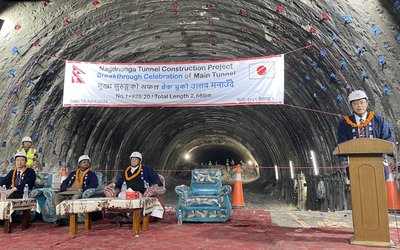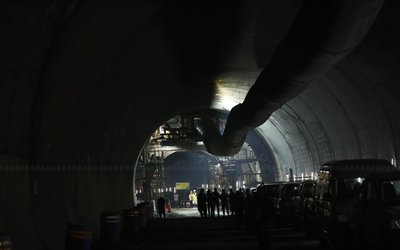In the last week of March, CPN-UML affiliated Nepal’s Civil Service Employees Association locked up the door of Ministry of General Administration for a couple of days over the transfer issue. Similarly, Secretary at the Ministry of Education Kishore Thapa walked out of the room when members of Civil Employees Association threatened to physically assault him.
Just a week back, members of Maoist affiliated Civil Service Employees Association threatened the director general of Customs Department to face serious consequences if he did not leave the office.
This trend is not only a feature of government offices now. Private sector industries, including the hotels, have also been facing hard times in a similar manner. Construction workers have launched a strike, paralyzing many development projects. Be it in the government or the private sector, Nepal’s Trade Unions are turning into groups of violent people, who can physically threaten managers, owners and other senior employees, who do not bow down before them.
As Nepal celebrated 123rd May Day by organizing various programs and calling for harmonization of relations, the reality is different and the environment is very hostile. Instead of going for negotiations, trade union leaders start their agitation by locking the industries.
Due to the growing militancy in trade unions, more than a half a dozen industries have already shut down in the last one year and many industries are under a constant threat of physical assault by trade union workers.
Although several efforts have been made in the past to improve the relations between industrialists and labor, major progress seems elusive as ever. As growing tensions are more of norm in industries and business, the need to maintain harmonious relations between trade union workers and industrialists and managers has become more urgent.
“Despite suffering from intense and long political instability, high interest rate, and increasing energy crisis, Nepali industries have been running smoothly, with sporadic incidents. This is possible because of the important role played by labors,” said Binod Chaudhari, industrialist and president of Confederation of Nepalese Industries. In his message to May Day, Chaudhari said in the recent past Nepal’s labor relations were heading towards harmonization.
“CNI and its affiliated industries want to see Nepal’s labor relations more industry-friendly. For this, support and help of laborers affiliated to various Trade Union organizations are inevitable. Labor and industrialists need to join together to make progress,” said Chaudhary.
In the last one decade, labor relations have changed much, but they are not free of problems. “Despite improvement in the overall relations, there are still a lot of things to do in this area,” said Suraj Vaidya president of Federation of Nepalese Chambers of Commerce and Industries.
The situation in labor sector is still volatile. A recent example is the labor dispute in Surya Nepal, where the government intervened. It asked the management and trade unions of Surya Nepal, a multinational company, to resolve the tension through dialogues.
At a time when the market for foreign investment is competitive, countries like Nepal need to prove that their domestic environment is friendly to investors and climate is conducive. However, the situation is yet to improve in Nepal’s case for the desired outcome.
The long-running labor dispute at Surya Nepal - the largest tobacco manufacturer in the country - has come to an end after the management addressed the demands placed by the workers.
Rabi KC, corporate vice-president of Surya Nepal, said the company lost around 60 percent of daily production during the protest period.
At a time when industrialists are complaining about the rise of trade unions, the number of trade unions in Nepal has increased drastically. A total of 86 new trade unions were added in the last six years, that is, after People's Movement II. As of now, there are 286 trade unions registered at the Department of Labor (DoL), up from 200 in fiscal 2005-06.
Out of the total 286 registered trade unions, 135 were affiliated to 10 trade union federations while the rest were working independently. Most of these trade union federations are affiliated with the major political parties.
According to the DoL, the Communist Party of Nepal (Unified Marxist Leninist)'s General Federation of Nepalese Trade Unions (GEFONT) is the largest trade union federation in the country with 29 trade union associations under its affiliation. Similarly, the Maoists' All Nepal Trade Union Federation (ANTUF) has 14 and the Nepali Congress' Nepal Trade Union Congress (NTUC) has 10 trade union associations under their affiliation.
Pashupati Murarka, chairman of the Employers' Council at the Federation of Nepalese Chambers of Commerce and Industry (FNCCI), said that with the growing number of trade union associations and federations, the industrial sector has become the victim as these unions are mainly busy in their own ego tussles.
"The recent labour unrest took a long time be resolved due to the different voices from different trade unions," said Murarka. He added there were many factions within a trade union federation.
On April 28, General Federation of Nepalese Trade Unions (GEFONT) extended its best wishes to all the workers in both national and international workplaces for a healthy, respected and secure life on the occasion of International Commemoration Day.
“Our major agenda is to strengthen the health safety and minimize the accidents to the zero level because health is one of the important labour rights,” it said.
Ignoring the guarantee of health, rights, decent work and respected life of workers, government and employers are only concentrating on productivity. “We appeal to the government and employers to provide a guarantee to a healthy, respected and secure life of the workers for high productivity.”
Extending condolences to all the workers of the world who lost their lives because of industrial accidents and occupational diseases, it referred especially to the Nepalese workers, who lost their lives in the foreign lands in difficult circumstances.
“Many of those have returned in the coffins, many of them are buried in the foreign land; we pay our commiseration to all of them. And to those who are injured and sick, we wish them to get well soon. To achieve our goal, firstly we have to have the safe and healthy working place. Thus, we wish all the best for our work to achieve our goal with unity and commitment.”
Trade union leaders see the situation differently. They held the view that the problems in the industries are related to the problems generated by management. “Labor relations have much improved now and laborers are disciplined and organized compared to past few years,” said Bishnu Rimal, president of GEFONT.
There will be no stability in the absence of peace and constitution. "Labour agenda is yet to be heard by all top brasses of political parties," President Rimal opined.
"The issue of representation, as of other segments of society, is among major demands. The provision of national labour commission as constitutional body is other important issue. It will be just insufficient if we could able to include only right to organization and collectively bargain as the fundamental rights in new constitution.” “Many of those have returned in the coffins, many of them are buried in the foreign land; we pay our commiseration to all of them. And to those who are injured and sick, we wish them to get well soon. To achieve our goal, firstly we have to have the safe and healthy working place. Thus, we wish all the best for our work to achieve our goal with unity and commitment.”
Trade union leaders see the situation differently. They held the view that the problems in the industries are related to the problems generated by management. “Labor relations have much improved now and laborers are disciplined and organized compared to past few years,” said Bishnu Rimal, president of GEFONT.
There will be no stability in the absence of peace and constitution. "Labour agenda is yet to be heard by all top brasses of political parties," President Rimal opined.
"The issue of representation, as of other segments of society, is among major demands. The provision of national labour commission as constitutional body is other important issue. It will be just insufficient if we could able to include only right to organization and collectively bargain as the fundamental rights in new constitution.”
- TANAHU HYDROPOWER PROEJCT: A Significant Achievement
- Apr 15, 2024
- AMBASSADOR HANAN GODAR: Sharing Pain With A Nepali Family
- Mar 30, 2024
- VISIT OF KfW AND EIB TO NEPAL : Mission Matters
- Mar 25, 2024
- NEPAL BRITAIN SOCIETY: Pratima Pande's Leadership
- Mar 24, 2024
- NEPAL ARMY DAY: Time To Recall Glory
- Mar 15, 2024
















